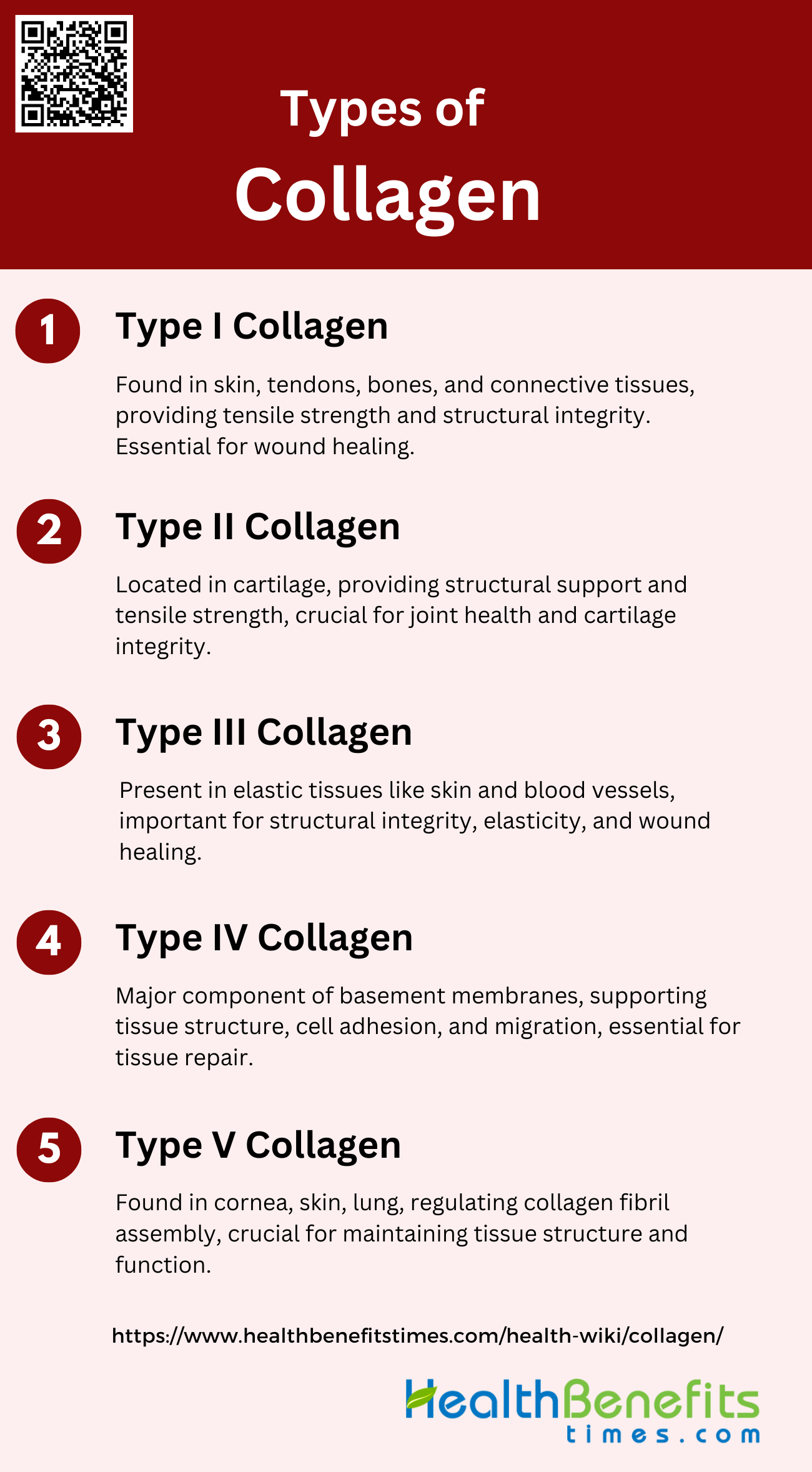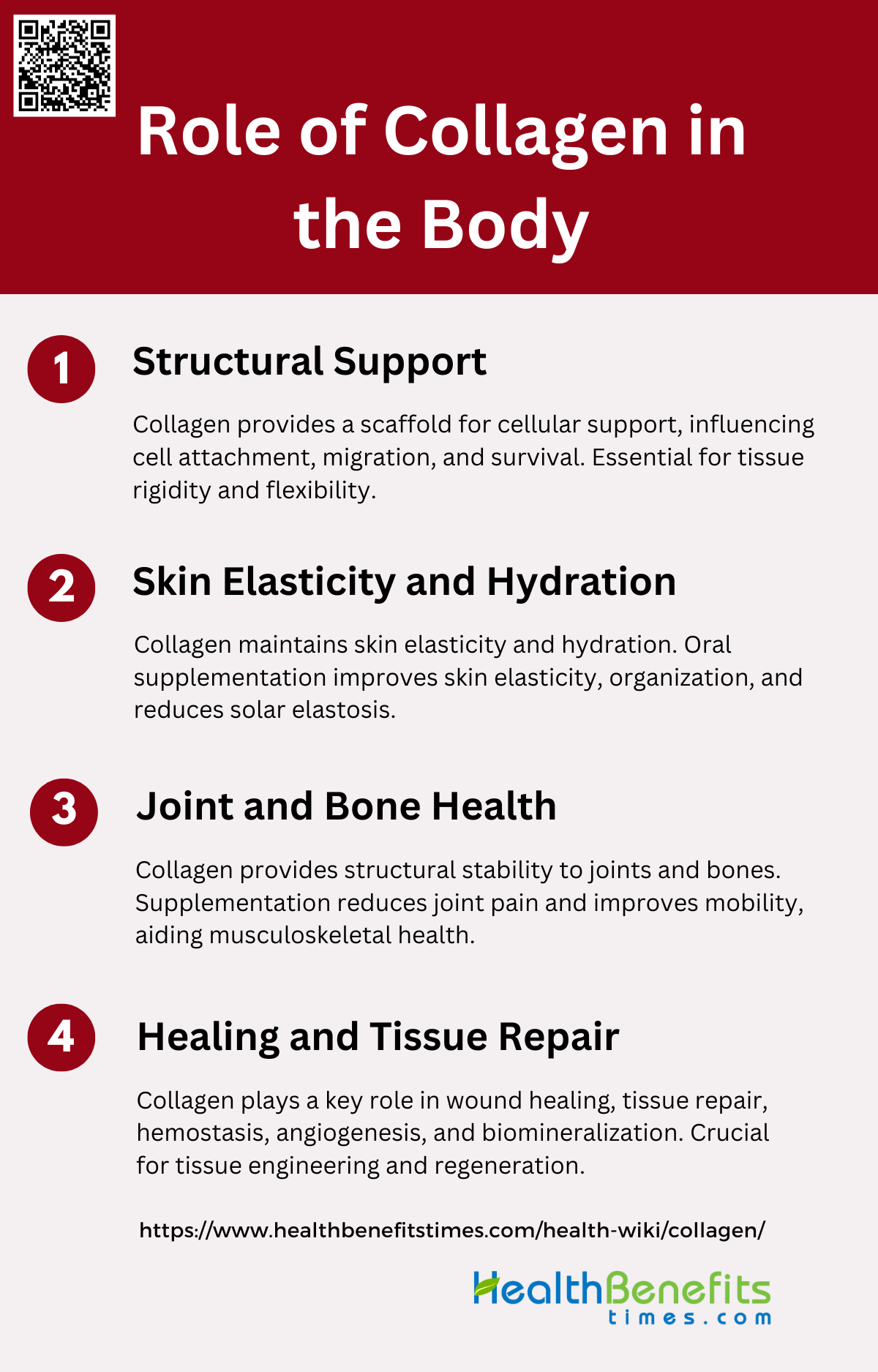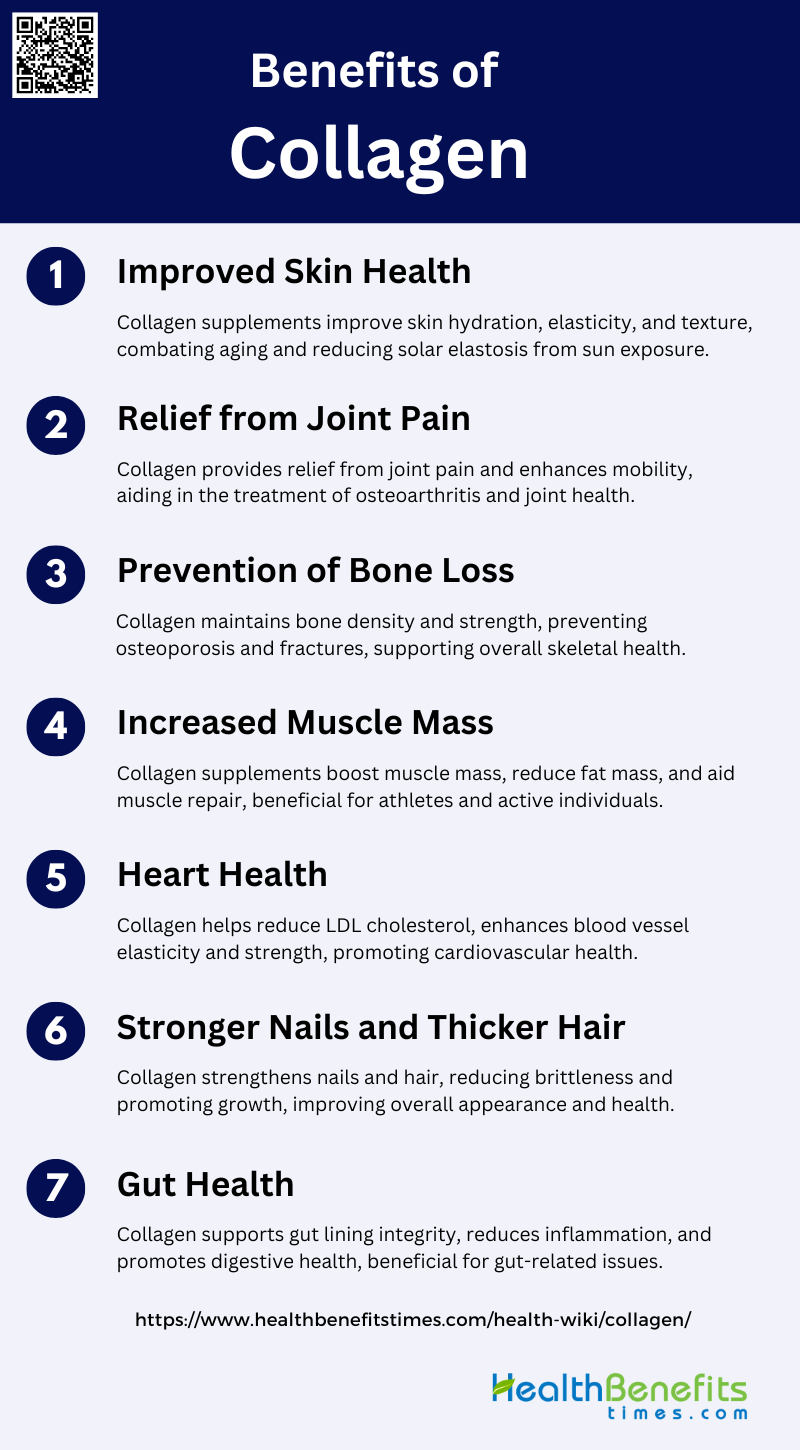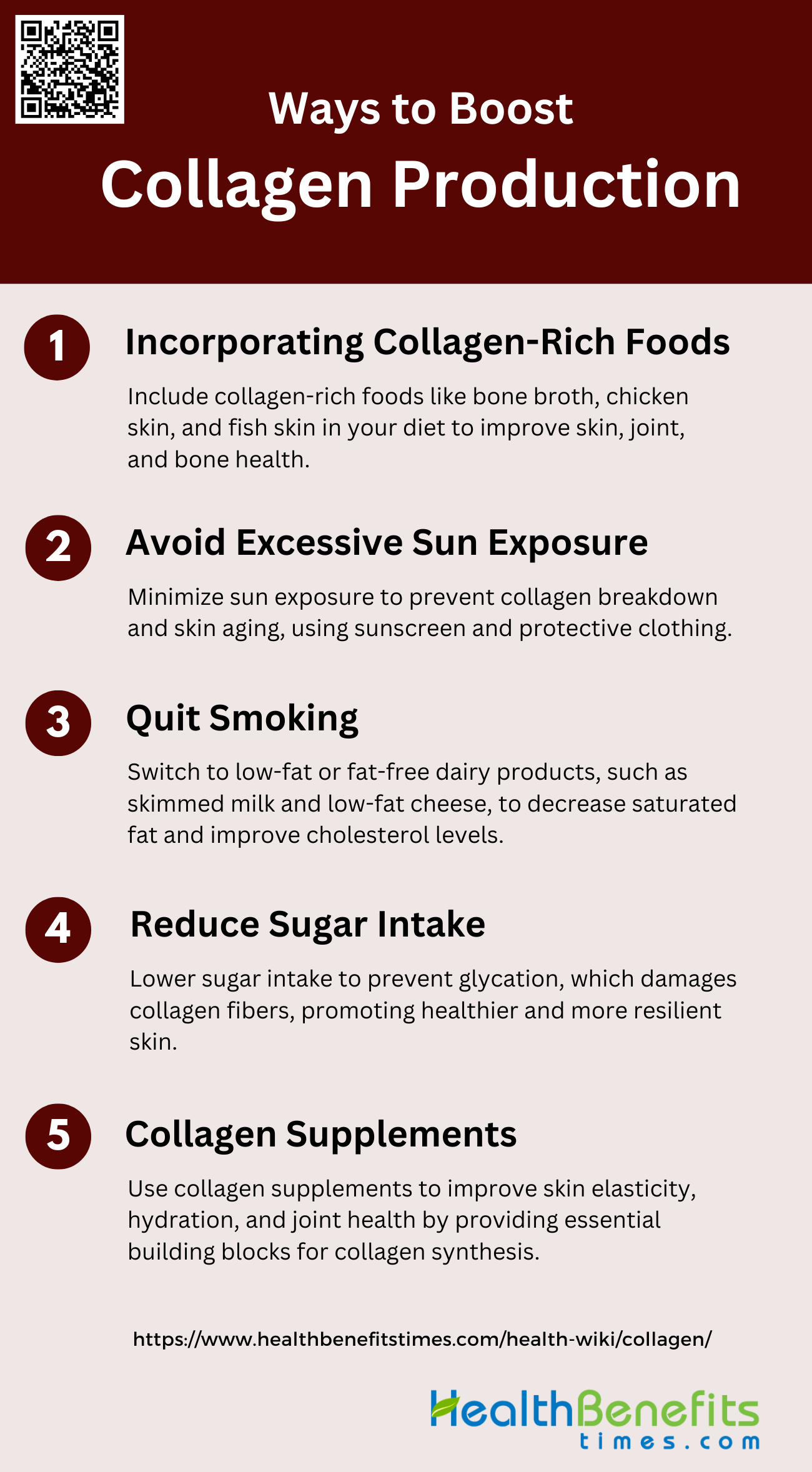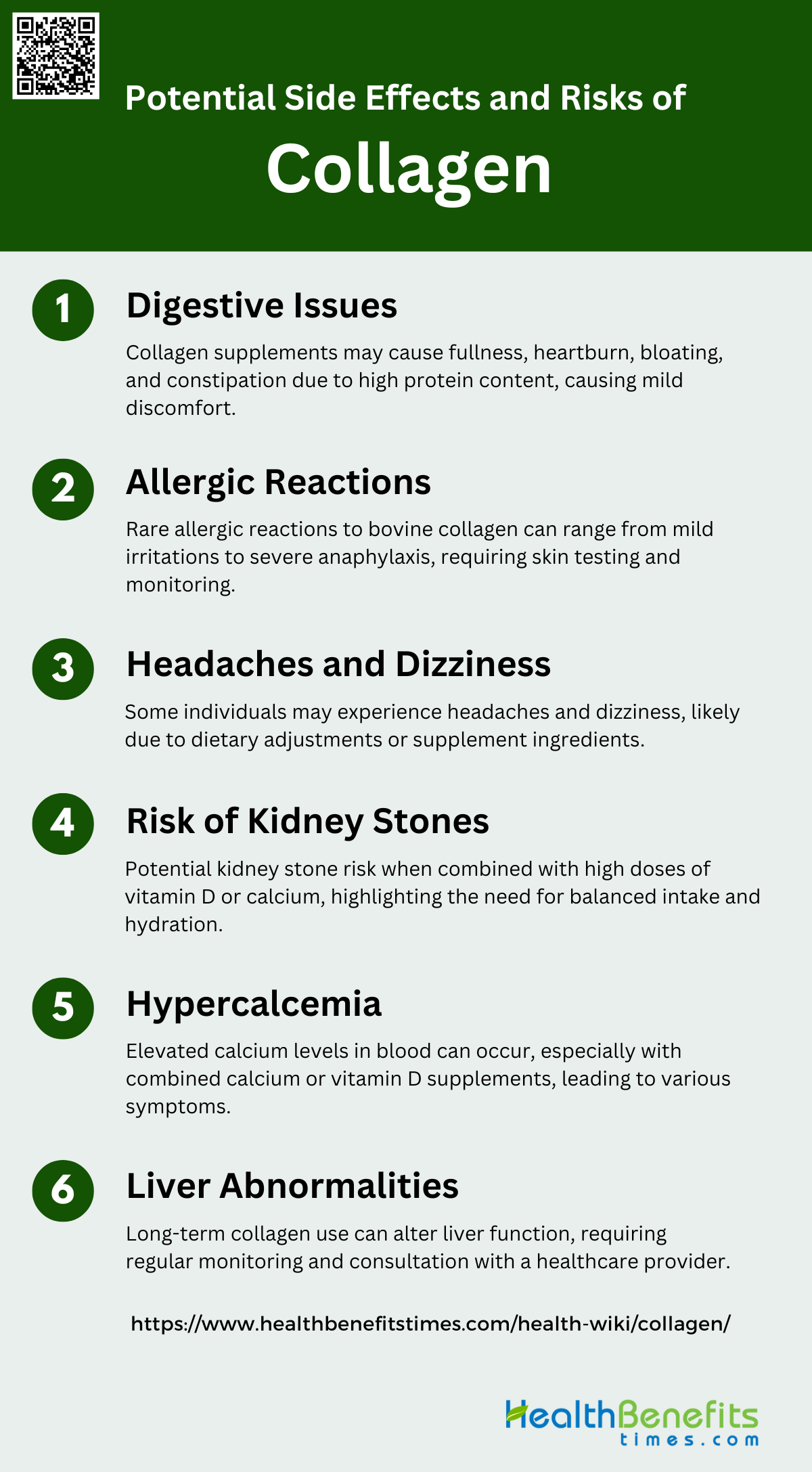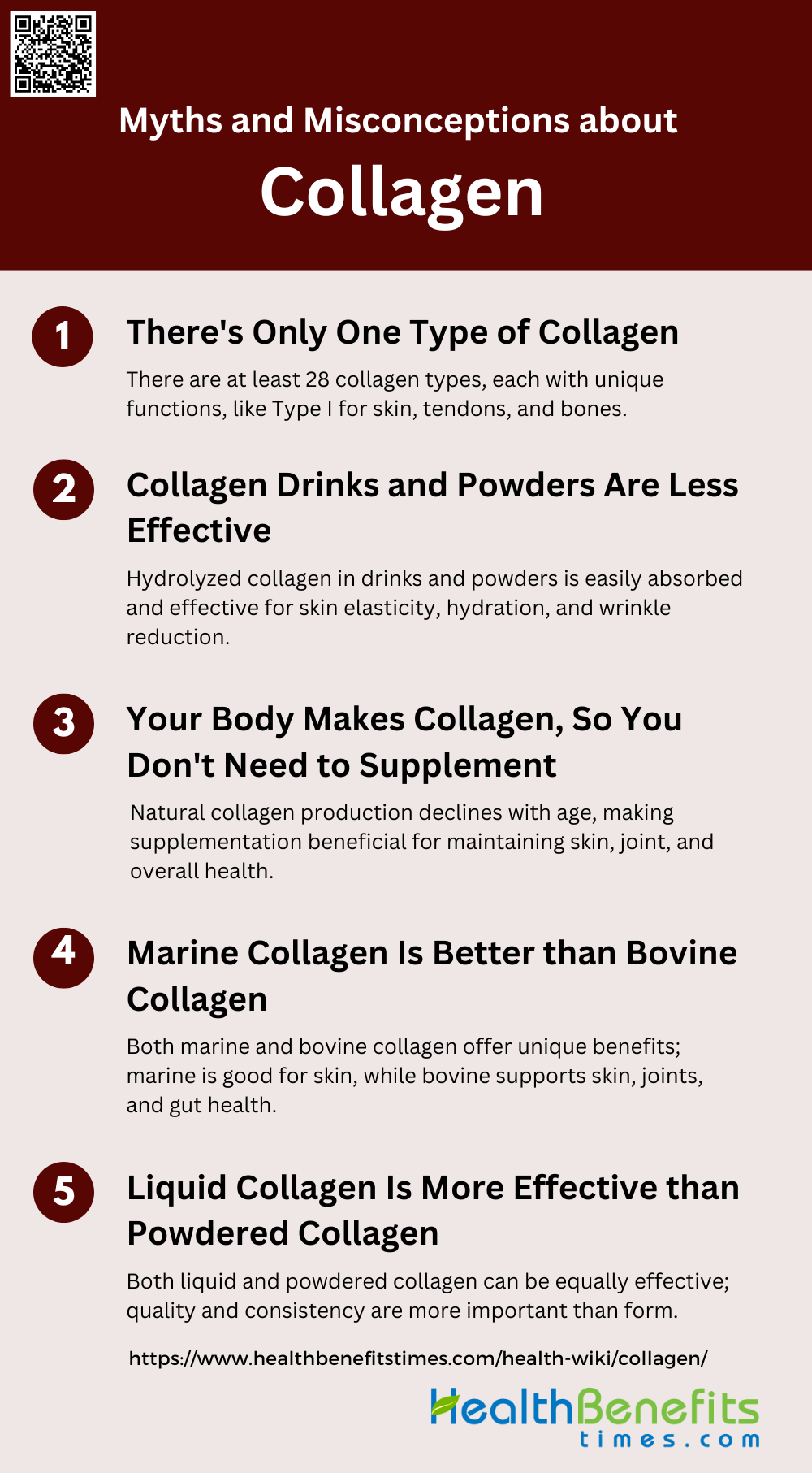Collagen is a family of proteins that form the primary structural component of the extracellular matrix in various connective tissues of the body. It is composed of 28 different types, each with unique functions and locations, such as skin, bones, tendons, and cartilage. Collagen provides tensile strength and structural integrity, playing a crucial role in tissue repair, cellular processes, and maintaining skin elasticity and firmness. It is synthesized by fibroblasts and other cells, and its production decreases with age, leading to signs of aging such as wrinkles and joint issues. Collagen’s importance extends to medical applications, including wound healing and as a biomaterial for tissue engineering and regenerative medicine.
Types of Collagen
Collagen is a vital protein in the human body, with multiple types each serving unique functions. Understanding the different types of collagen can help in appreciating their roles in maintaining structural integrity and promoting tissue health. Here are the primary types of collagen:
1. Type I Collagen
Type I collagen is predominantly found in vasculature, skin, tendons, bones, and other connective tissues. It serves as the primary structural component of the extracellular matrix (ECM), providing tensile strength and structural integrity to various tissues. Due to its high biocompatibility and physicochemical properties, Type I collagen is widely used in pharmaceutical, cosmeceutical, regenerative medicine, and clinical applications. It mimics the natural ECM, making it ideal for tissue engineering and wound healing.
2. Type II Collagen
Type II collagen is primarily located in cartilage, particularly in articular cartilage, and is a major component of the cartilage matrix. It provides structural support and tensile strength to cartilage, enabling it to withstand compressive forces. It plays a crucial role in maintaining the integrity and function of cartilage. Type II collagen is essential for joint health, as it helps maintain the cartilage structure and function. It is often used in supplements aimed at improving joint health and treating conditions like osteoarthritis.
3. Type III Collagen
Type III collagen is found in tissues that exhibit elastic properties, such as the skin, arterial walls, and hollow organs like large blood vessels, uterus, and bowel. It plays a key role in the structural integrity and elasticity of these tissues. It is also involved in wound healing and interacts with platelets in the blood clotting cascade. Type III collagen is crucial for maintaining the structural integrity of skin and blood vessels. Mutations in the COL3A1 gene, which encodes Type III collagen, can lead to vascular Ehlers-Danlos syndrome, highlighting its importance in vascular health.
4. Type IV Collagen
Type IV collagen is a major component of basement membranes, which are thin, sheet-like structures that separate and support various tissues. It provides structural support and acts as a barrier between different tissue types. It also plays a role in cell adhesion, migration, and differentiation. Type IV collagen is essential for the integrity and function of basement membranes. It helps maintain the structure of tissues and organs, and its role in cell adhesion and migration is crucial for tissue repair and regeneration.
5. Type V Collagen
Type V collagen is found in the cornea, skin, lung, and other connective tissues. It is often co-distributed with Type I collagen. It regulates the assembly of collagen fibrils, particularly in the cornea, where it co-assembles with Type I collagen to form heterotypic fibrils. It also plays a role in connecting interstitial collagen fibrils with membranous collagen networks. Type V collagen is crucial for the proper assembly and function of collagen fibrils, which are essential for the structural integrity of tissues. Its role in fibril assembly and interaction with other collagen types makes it important for maintaining tissue structure and function.
Role of Collagen in the Body
Collagen is essential for maintaining the structural integrity and function of various tissues in the body. It supports skin elasticity, strengthens bones, and aids in wound healing. Here are some key roles of collagen:
1. Structural Support
It forms the major part of the extracellular matrix, characterizing the structure of skin, connective tissues, tendons, bones, and cartilage. Collagen’s unique triple helical structure, composed mainly of glycine and proline amino acids, is synthesized by fibroblasts and is crucial for maintaining the structural integrity of various tissues and organs. Any imbalance in collagen types within the extracellular matrix can lead to structural issues, affecting tissue rigidity and flexibility.
2. Skin Elasticity and Hydration
Collagen plays a vital role in maintaining skin elasticity and hydration. It provides elasticity and waterproofing to the skin, contributing to its overall health and appearance. Daily oral supplementation with collagen peptides, combined with vitamins and other bioactive compounds, has been shown to significantly improve skin elasticity and hydration. A clinical trial demonstrated a 40% increase in skin elasticity and positive changes in skin architecture, including improved collagen fiber organization and reduced solar elastosis. Collagen XII, in particular, helps maintain skin matrix structure and regulates cellular composition, which is crucial for skin homeostasis and repair.
3. Joint and Bone Health
Collagen is essential for joint and bone health, providing structural stability to connective tissues such as tendons and bones. It plays a significant role in the biomechanical properties of the extracellular matrix in articular cartilage, which is crucial for joint function. Oral supplementation with collagen peptides has been shown to reduce joint pain by 43% and improve joint mobility by 39%, highlighting its beneficial effects on joint health. Additionally, recombinant human collagen serves as an efficient scaffold for bone repair, supporting tissue regeneration and reconstruction. Collagen’s role in maintaining bone strength and joint health makes it a promising candidate for treating musculoskeletal disorders.
4. Healing and Tissue Repair
Collagen is pivotal in wound healing and tissue repair. It orchestrates the form and function of tissues such as bone, tendon, and skin, playing roles in hemostasis, wound healing, angiogenesis, and biomineralization. Collagen XII, for instance, assists in orchestrating proper skin matrix structure, controls growth factor availability, and regulates cellular composition and function, which are essential for re-establishing homeostasis after injury. The development of collagen-based scaffolds and matrices is crucial for therapeutic cartilage repair, as they serve as vehicles for cell and growth factor transport into cartilage lesions. Collagen’s versatile properties make it a key component in tissue engineering and regenerative medicine.
Sources of Collagen
Collagen can be obtained from various dietary and supplemental sources to support the body’s natural production. These sources are essential for maintaining healthy skin, joints, and connective tissues. Here are some sources of collagen:
1. Natural Sources of Collagen
Collagen, a vital protein for connective tissues, is abundantly found in various natural sources. Traditional sources include bone broth, which is rich in collagen extracted from animal bones and connective tissues. Fish, particularly the skin and scales, is another excellent source, providing marine collagen known for its high bioavailability. Additionally, pig skin and bovine hide are commonly used in the extraction of gelatin, a form of collagen, due to their high collagen content. These natural sources are not only integral to dietary intake but also play a significant role in various industrial applications, including food, cosmetics, and pharmaceuticals.
2. Collagen Supplements
Collagen supplements have gained popularity for their potential health benefits, particularly in skin aging, joint health, and muscle recovery. These supplements come in various forms, including collagen peptides, powders, and capsules. Collagen peptides are hydrolyzed forms of collagen, making them easier to digest and absorb. Studies have shown that gelatin supplementation, especially when enriched with vitamin C, can significantly enhance collagen synthesis, which is beneficial for tissue repair and injury prevention. The cosmetic industry also incorporates collagen in creams and nutritional supplements aimed at improving skin elasticity and reducing wrinkles.
3. Plant-Based Options
While collagen itself is not found in plants, certain plant-based foods can support the body’s natural collagen production. Vitamin C-rich foods, such as citrus fruits, berries, and bell peppers, are crucial as vitamin C is essential for collagen synthesis. Leafy greens like spinach and kale provide antioxidants that protect collagen from damage. Additionally, foods rich in amino acids, such as beans, nuts, and seeds, contribute to the building blocks needed for collagen production. These plant-based options are vital for those seeking to boost collagen levels through a vegetarian or vegan diet.
Benefits of Collagen
Collagen plays a crucial role in maintaining the health and functionality of various body tissues. Its benefits extend beyond structural support, impacting skin appearance, joint health, and wound healing. Here are some key benefits of collagen:
1. Improved Skin Health
Collagen supplementation has been shown to significantly improve skin health by enhancing hydration, elasticity, and overall texture. Studies indicate that daily oral intake of collagen peptides, combined with vitamins and other bioactive compounds, can lead to a 40% increase in skin elasticity and a reduction in solar elastosis, which is the degeneration of elastic tissue due to sun exposure. Another study demonstrated that collagen supplements improve skin hydration, elasticity, roughness, and density, with these benefits being sustained even after the supplementation period. These findings suggest that collagen can be an effective measure to combat skin aging and improve skin health.
2. Relief from Joint Pain
Collagen supplementation has been found to provide significant relief from joint pain and improve joint mobility. In a double-blind, randomized, placebo-controlled clinical trial, participants who consumed a collagen-based nutraceutical reported a 43% reduction in joint pain and a 39% improvement in joint mobility. Collagen peptides are considered potential therapeutic agents for treating osteoarthritis and maintaining joint health, as they help in the synthesis and maintenance of cartilage. These benefits make collagen a promising supplement for individuals suffering from joint-related issues.
3. Prevention of Bone Loss
As collagen production decreases with age, the risk of bone loss and fractures increases. Collagen supplementation has been shown to help in maintaining bone density and strength, thereby preventing bone loss. The protein’s ability to enhance the synthesis of bone matrix components and improve bone mineral density makes it a valuable supplement for preventing osteoporosis and other bone-related conditions. This highlights the importance of collagen in supporting skeletal health.
4. Increased Muscle Mass
Collagen supplementation has been linked to increased muscle mass and improved body composition. Studies have shown that collagen peptides can significantly reduce fat mass and increase lean muscle mass, making them beneficial for individuals looking to improve their muscle tone and overall body composition. The protein’s role in muscle repair and regeneration further supports its use in enhancing muscle mass. This makes collagen a valuable supplement for athletes and individuals engaged in regular physical activity.
5. Heart Health
Collagen supplementation may also contribute to cardiovascular health. Research indicates that collagen can help reduce LDL cholesterol levels and improve overall heart health. The protein’s role in maintaining the structural integrity of blood vessels and promoting healthy circulation further supports its cardiovascular benefits. By enhancing the elasticity and strength of blood vessels, collagen can help reduce the risk of cardiovascular diseases, making it a beneficial supplement for heart health.
6. Stronger Nails and Thicker Hair
Collagen has been shown to improve the health of nails and hair, making them stronger and thicker. Oral supplementation with hydrolyzed collagen has demonstrated beneficial effects on nail and skin health, and it could also improve hair growth. The protein’s role in providing structural support to hair and nails helps in reducing brittleness and promoting growth. This makes collagen a valuable supplement for individuals looking to enhance the appearance and health of their hair and nails.
7. Gut Health
Collagen is an essential component of the gut lining and plays a crucial role in maintaining gut health. It helps in the cohesion of tissues and organs, including the lining of the intestines, thereby supporting gut integrity. Collagen supplementation can aid in repairing the gut lining, reducing inflammation, and promoting overall digestive health. This makes it a beneficial supplement for individuals suffering from gut-related issues, such as leaky gut syndrome and inflammatory bowel diseases.
Ways to Boost Collagen Production
Boosting collagen production is essential for maintaining healthy skin, joints, and overall tissue integrity. Various lifestyle choices and dietary habits can significantly enhance the body’s ability to produce collagen. Here are some effective ways to boost collagen production:
1. Incorporating Collagen-Rich Foods
Incorporating collagen-rich foods into your diet can significantly boost collagen production. Foods like bone broth, chicken skin, and fish skin are excellent sources of collagen. These foods contain high levels of glycine, proline, and hydroxyproline, which are amino acids essential for collagen synthesis. Studies have shown that consuming collagen-rich foods can improve skin elasticity and hydration, as well as support joint and bone health. For example, traditional Korean foods rich in collagen have been found to enhance bone metabolism and reduce osteoclast activity, which is crucial for maintaining bone density in postmenopausal women.
2. Avoid Excessive Sun Exposure
Excessive sun exposure can severely damage your skin’s collagen fibers. Ultraviolet (UV) radiation from the sun accelerates the breakdown of collagen and elastin in the skin, leading to premature aging, wrinkles, and sagging. UV rays activate enzymes called matrix metalloproteinases (MMPs), which degrade collagen and other structural proteins in the skin. To protect your collagen, it’s essential to use broad-spectrum sunscreen with at least SPF 30, wear protective clothing, and avoid peak sun hours. By minimizing sun exposure, you can preserve your skin’s collagen and maintain its youthful appearance.
3. Quit Smoking
Smoking is detrimental to collagen production and overall skin health. The chemicals in tobacco smoke reduce blood flow to the skin, depriving it of oxygen and essential nutrients needed for collagen synthesis. Additionally, smoking increases the production of free radicals, which damage collagen and elastin fibers, leading to premature skin aging and wrinkles. Quitting smoking can significantly improve your skin’s ability to produce collagen, enhance its elasticity, and reduce the appearance of fine lines. The benefits extend beyond skin health, positively impacting overall well-being and reducing the risk of numerous diseases.
4. Reduce Sugar Intake
High sugar intake can negatively affect collagen production through a process called glycation. Glycation occurs when sugar molecules bind to collagen fibers, making them stiff and brittle. This process not only accelerates skin aging but also impairs the skin’s ability to repair itself. Reducing sugar intake can help maintain the integrity of collagen fibers, promoting healthier, more resilient skin. Opt for a balanced diet rich in antioxidants, vitamins, and minerals to support collagen synthesis and protect against oxidative stress, which further degrades collagen.
5. Collagen Supplements
Collagen supplements have gained popularity for their potential to enhance skin health and support joint function. These supplements typically contain hydrolyzed collagen, which is broken down into smaller peptides for easier absorption. Research suggests that collagen supplements can increase skin elasticity, hydration, and reduce the appearance of wrinkles. They may also improve joint health by providing the necessary building blocks for cartilage repair. Incorporating collagen supplements into your daily routine can be an effective way to boost your body’s collagen production and promote overall skin and joint health.
Potential Side Effects and Risks of Collagen
While collagen supplements are widely praised for their benefits in skin health and joint support, they are not without potential side effects and risks. Understanding these risks is crucial for making informed decisions about incorporating collagen into your health regimen. Below are some of the potential side effects and risks associated with collagen supplementation:
1. Digestive Issues
Collagen supplements can sometimes lead to digestive issues, including feelings of fullness, heartburn, and a lingering bad taste in the mouth. These side effects are generally mild but can be bothersome for some individuals. The digestive system may react to the high protein content in collagen, leading to symptoms such as bloating and constipation. In some cases, the body may struggle to break down the collagen peptides, causing gastrointestinal discomfort. It is important to monitor these symptoms and consult a healthcare provider if they persist or worsen.
2. Allergic Reactions
Allergic reactions to collagen, particularly bovine collagen, are relatively rare but can occur. These reactions can range from mild skin irritations to more severe responses such as anaphylaxis. Studies have shown that a small percentage of patients treated with bovine collagen implants exhibit adverse reactions involving both cellular and humoral immune responses. Skin testing and monitoring of circulating antibodies can help identify individuals at risk. Symptoms of an allergic reaction may include swelling, redness, itching, and in severe cases, difficulty breathing.
3. Headaches and Dizziness
Some individuals may experience headaches and dizziness as side effects of collagen supplementation. These symptoms are not commonly reported but can occur, particularly in those who are sensitive to changes in their diet or supplement intake. The exact mechanism behind these side effects is not well understood, but it may be related to the body’s adjustment to the increased protein intake or other ingredients in the collagen supplement. If these symptoms persist, it is advisable to reduce the dosage or discontinue use and consult a healthcare provider.
4. Risk of Kidney Stones
There is a potential risk of kidney stones associated with collagen supplementation, particularly if taken in conjunction with high doses of vitamin D or calcium. Long-term studies have shown that excessive intake of these supplements can lead to hypercalciuria (high levels of calcium in the urine), which is a risk factor for kidney stone formation. While collagen itself is not directly linked to kidney stones, its combination with other supplements may increase the risk. It is important to maintain a balanced intake and stay hydrated to mitigate this risk.
5. Hypercalcemia
Hypercalcemia, or elevated calcium levels in the blood, can be a side effect of collagen supplementation, especially when combined with calcium or vitamin D supplements. This condition can lead to various symptoms, including nausea, vomiting, frequent urination, and confusion. Long-term studies have indicated that vitamin D supplementation, which is often taken alongside collagen, can increase the risk of hypercalcemia. Monitoring calcium levels and consulting with a healthcare provider before starting any new supplement regimen is crucial to avoid this condition.
6. Liver Abnormalities
Collagen supplementation has been associated with changes in liver function, particularly with long-term use. Studies on animals have shown that oral administration of collagen can lead to alterations in liver parameters and histopathological changes. These findings suggest a potential risk of sub-acute and acute toxic effects on the liver. It is important to monitor liver function regularly when taking collagen supplements, especially for extended periods, and to consult a healthcare provider if any abnormalities are detected.
Myths and Misconceptions about Collagen
Collagen supplements have gained immense popularity, but with this rise come a plethora of myths and misconceptions. It’s crucial to separate fact from fiction to make informed decisions about collagen use. Below are some common myths and misconceptions about collagen:
1. Myth: There’s Only One Type of Collagen
One common misconception is that there is only one type of collagen. In reality, there are at least 28 different types of collagen, each serving unique functions in the body. The most prevalent types are Type I, II, and III. Type I collagen is found in skin, tendons, and bones, providing tensile strength. Type II is primarily located in cartilage, offering elasticity and cushioning. Type III is present in the skin, lungs, and vascular system, contributing to structural integrity. Understanding these differences is crucial for selecting the right type of collagen for specific health needs.
2. Myth: Collagen Drinks and Powders Are Less Effective
Another myth is that collagen drinks and powders are less effective than other forms of supplementation. However, studies have shown that hydrolyzed collagen in these forms is easily absorbed by the body. Hydrolyzed collagen is broken down into smaller peptides, making it more bioavailable. Clinical trials have demonstrated that collagen supplements, whether in drink or powder form, can improve skin elasticity, hydration, and reduce wrinkles. The key is to choose high-quality products and maintain consistent use to see the best results.
3. Myth: Your Body Makes Collagen, So You Don’t Need to Supplement
While it is true that the body naturally produces collagen, this production declines with age, starting as early as the mid-20s. Factors like UV exposure, smoking, and poor diet can further accelerate collagen degradation. Supplementing with collagen can help counteract this decline, supporting skin health, joint function, and overall vitality. Research indicates that collagen supplementation can stimulate the body’s own collagen production, making it a valuable addition to a healthy lifestyle.
4. Myth: Marine Collagen Is Better Than Bovine Collagen
The belief that marine collagen is superior to bovine collagen is not entirely accurate. Both types of collagen offer unique benefits and are effective for different purposes. Marine collagen, derived from fish, is known for its high bioavailability and is rich in Type I collagen, making it excellent for skin health. Bovine collagen, sourced from cows, contains both Type I and Type III collagen, supporting skin, joints, and gut health. The choice between marine and bovine collagen should depend on individual health goals and dietary preferences.
5. Myth: Liquid Collagen Is More Effective Than Powdered Collagen
Many people believe that liquid collagen is more effective than powdered collagen, but this is not necessarily true. Both forms can be equally effective if they contain high-quality, hydrolyzed collagen peptides. The effectiveness of collagen supplements depends more on the quality of the collagen and the presence of other supportive nutrients rather than the form it is consumed in. Whether you choose liquid or powdered collagen, consistency and quality are key to achieving the desired health benefits.



